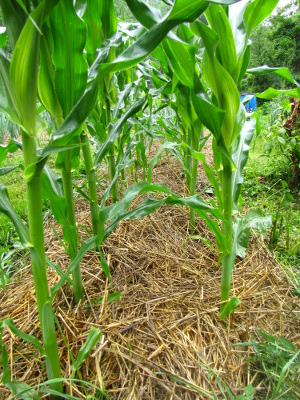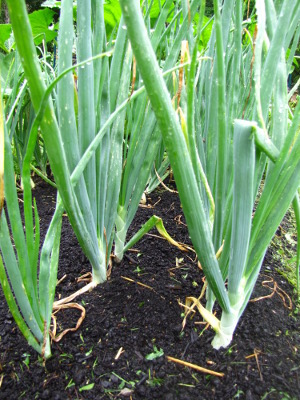
Straw vs. composted leaf mulch
 Which is better for the
vegetable garden, straw or composted
leaf mulch?
I'll have to wait a few more months before I can tell how each mulch
impacts the biology of the soil, but I'm already getting a feel for how
our two mulches are working.
Which is better for the
vegetable garden, straw or composted
leaf mulch?
I'll have to wait a few more months before I can tell how each mulch
impacts the biology of the soil, but I'm already getting a feel for how
our two mulches are working.
When it comes to ease of
application, each type of mulch has its pros and cons. Straw is
extremely easy to lay down around large plants, but is difficult to
work between tender young onions. I also tend to wait to apply
straw until seedlings are three or four inches tall since the straw
stalks can move around and overshadow youngsters. In contrast,
the composted leaf mulch takes more time and effort to shovel into the
wheelbarrow and back out, but is much easier to use around seedlings
since it stays where you put it and the soft particles can rain down
around young plants without hurting them.
 Price per bed seems to be nearly
identical for straw mulch and leaf compost mulch --- $1.40 per bed or
around 8 cents per square foot. The trouble with making this
comparison, though, is that I can't tell how long each mulch will last
before I need to reapply. My gut says that the leaf compost might
last longer, but only time will tell.
Price per bed seems to be nearly
identical for straw mulch and leaf compost mulch --- $1.40 per bed or
around 8 cents per square foot. The trouble with making this
comparison, though, is that I can't tell how long each mulch will last
before I need to reapply. My gut says that the leaf compost might
last longer, but only time will tell.
Of course, the real
deciding point will probably be how the vegetables perform surrounded
by each type of mulch. The amount of organic matter added to the
soil (measured using a worm
test) will also be
key. Maybe by this time next year, I will have decided on a
favorite type of storebought mulch (and put some thought into how to
grow it myself.)
Want more in-depth information? Browse through our books.
Or explore more posts by date or by subject.
About us: Anna Hess and Mark Hamilton spent over a decade living self-sufficiently in the mountains of Virginia before moving north to start over from scratch in the foothills of Ohio. They've experimented with permaculture, no-till gardening, trailersteading, home-based microbusinesses and much more, writing about their adventures in both blogs and books.
Want to be notified when new comments are posted on this page? Click on the RSS button after you add a comment to subscribe to the comment feed, or simply check the box beside "email replies to me" while writing your comment.

Geoffrey --- Thanks for chiming in! It's great to hear from someone who's had firsthand experience with the composted leaf mulch. It does look like it would be a great soil amendment, almost like peat moss.
Everett --- I think you're right about letting the bale precompost for a few weeks to put around seedlings. I'll bet that if I was smart, I'd pull a few bales out of their circus tent every week and cycle through them that way.
Dave --- I'm glad you asked that because I'd been meaning to post a followup, but didn't have any good photos so haven't turned it into a post. I'd never turn away mulch of any kind, but have decided that given the option, I prefer straw. The leaf mulch is slightly problematic in the garden since it looks like topsoil, so I tend to forget to rake it back before planting seeds, and then the seeds don't do well. At the same time, weed seeds are more likely to germinate there than they are beneath a straw mulch. So, we'll be focusing on straw as long as we keep a good source.
I'd never turn away mulch of any kind, but have decided that given the option, I prefer straw. The leaf mulch is slightly problematic in the garden since it looks like topsoil, so I tend to forget to rake it back before planting seeds, and then the seeds don't do well. At the same time, weed seeds are more likely to germinate there than they are beneath a straw mulch. So, we'll be focusing on straw as long as we keep a good source.
Straw is okay for deep bedding, but I prefer tree leaves. The chickens don't scratch through straw as much, and it's lower in carbon, so you need to use more of it to keep the manure from smelling. I tend to use straw when I'm pressed for time and don't want to take a half hour to rake leaves out of the woods.